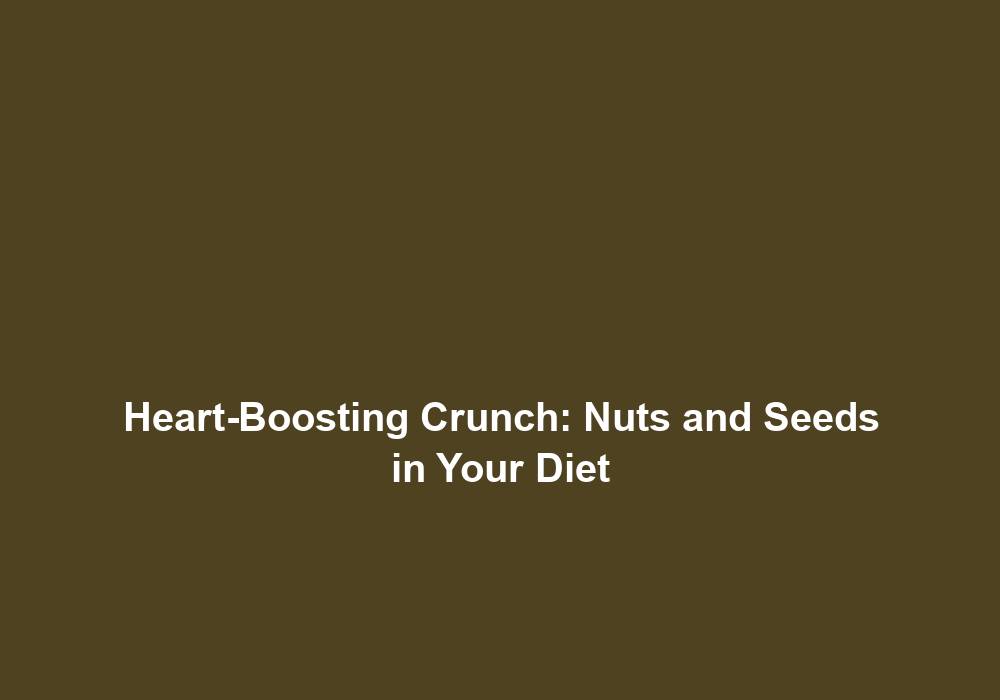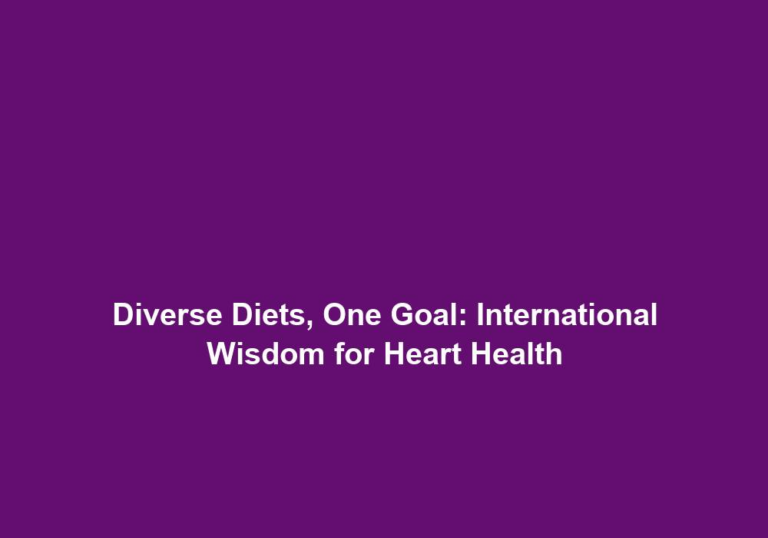Heart-Boosting Crunch: Nuts and Seeds in Your Diet
Nuts and seeds are not only delicious, but they also provide incredible health benefits, particularly when it comes to supporting heart health. Packed with essential nutrients, healthy fats, and antioxidants, incorporating nuts and seeds into your diet can help lower the risk of heart disease and promote overall well-being. In this article, we will explore the various types of nuts and seeds that contribute to a heart-boosting diet and discuss their specific benefits.
Why Are Nuts and Seeds Beneficial for Heart Health?
Before delving into the specific types of nuts and seeds, it is important to understand why they are considered heart-healthy. Here are a few reasons:
- Rich in Healthy Fats: Nuts and seeds are abundant sources of monounsaturated and polyunsaturated fats, commonly known as healthy fats. These fats play a crucial role in reducing LDL (bad) cholesterol, which can lead to the formation of plaque in the arteries. By replacing unhealthy fats with these healthy alternatives, you can improve blood lipid profiles and lower the risk of cardiovascular diseases.
- Monounsaturated fats help increase levels of HDL (good) cholesterol, which scavenges and removes LDL cholesterol from the bloodstream.
- Polyunsaturated fats, specifically omega-3 fatty acids, have been shown to reduce inflammation, improve blood vessel function, and decrease the risk of abnormal heart rhythms.
- Packed with Fiber: Nuts and seeds are excellent sources of dietary fiber, which is beneficial for heart health. Fiber helps in reducing cholesterol levels, regulating blood sugar levels, and maintaining a healthy weight. By including nuts and seeds in your diet, you can promote healthy digestion and improve overall heart health.
- Soluble fiber found in nuts and seeds helps lower LDL cholesterol levels by binding to cholesterol in the digestive system and preventing its absorption into the bloodstream.
- Insoluble fiber adds bulk to the stool, promoting regular bowel movements and preventing constipation. This indirectly contributes to heart health by reducing the risk of conditions like hemorrhoids and diverticulosis.
- Abundant in Antioxidants: Antioxidants found in nuts and seeds, such as vitamin E, selenium, and various phytochemicals, help protect the body from oxidative stress and inflammation. These compounds contribute to the prevention of heart disease and the maintenance of a healthy cardiovascular system.
- Vitamin E is a powerful antioxidant that helps prevent the oxidation of LDL cholesterol, reducing the risk of plaque buildup in the arteries.
- Selenium is involved in the production of antioxidants enzymes, which help neutralize harmful free radicals and reduce inflammation.
Now, let’s explore some popular nuts and seeds that can enhance heart health when incorporated into your daily diet:
1. Almonds
Almonds are a versatile nut that can be enjoyed in various forms, such as raw, roasted, or as almond butter. They are an excellent source of vitamin E, magnesium, and protein. Regular consumption of almonds has been linked to lower LDL cholesterol levels, reduced inflammation, and improved heart health. Almonds can be a perfect snack, or you can add them to salads, smoothies, or oatmeal for an extra crunch and a nutritional boost.
- Almonds are also rich in arginine, an amino acid that helps relax blood vessels and improve blood flow, thus reducing the risk of high blood pressure.
- The magnesium content in almonds helps maintain a steady heartbeat and supports overall cardiovascular function.
2. Walnuts
Walnuts are not only delicious but also provide numerous heart-healthy benefits. They are rich in omega-3 fatty acids, which have been shown to lower blood pressure, reduce inflammation, and support overall cardiovascular health. Additionally, walnuts contain antioxidants and phytosterols, which further contribute to heart protection. Add a handful of walnuts to your morning cereal or yogurt, or simply enjoy them as a standalone snack.
- The omega-3 fatty acids in walnuts, specifically alpha-linolenic acid (ALA), help reduce the risk of abnormal heart rhythms, decrease triglyceride levels, and improve blood vessel function.
- Walnuts also contain melatonin, a hormone that promotes healthy sleep. Adequate sleep is important for heart health as it helps regulate blood pressure and reduce stress levels.
3. Flaxseeds
Flaxseeds are tiny powerhouses when it comes to heart health. They are one of the best plant-based sources of omega-3 fatty acids, specifically alpha-linolenic acid (ALA), which offers similar benefits to the omega-3s found in fish. Consuming flaxseeds regularly has been associated with improved cholesterol levels, reduced blood pressure, and decreased inflammation. To reap their benefits, grind whole flaxseeds and add them to smoothies, yogurt, or sprinkle them over salads.
- Flaxseeds also contain lignans, which are plant compounds with antioxidant and estrogen-like properties. These lignans have been shown to reduce the risk of cardiovascular disease by improving blood lipid profiles and reducing inflammation.
- The soluble fiber in flaxseeds helps lower cholesterol levels by binding to bile acids in the intestines and preventing their reabsorption.
4. Chia Seeds
Chia seeds have gained popularity for their nutritional value and numerous health benefits. They are loaded with omega-3 fatty acids, fiber, protein, and various essential minerals. Chia seeds can help regulate blood sugar levels, reduce LDL cholesterol, and promote heart health. You can mix them into your overnight oats, blend them into smoothies, or create a delicious chia seed pudding for a nutritious and heart-boosting snack.
- Chia seeds form a gel-like substance when soaked in liquid, which helps slow down the digestion of carbohydrates and stabilizes blood sugar levels.
- The high fiber content in chia seeds promotes satiety and can aid in weight management, which is important for overall heart health.
5. Pistachios
Pistachios not only offer a delightful taste but also contribute to heart health due to their nutrient content. They are rich in healthy fats, fiber, antioxidants, and phytosterols. Regular consumption of pistachios has been shown to improve cholesterol levels, reduce blood pressure, and enhance blood vessel function. Enjoy pistachios on their own, or add them to your favorite dishes, such as salads or roasted vegetable medleys.
- Pistachios are one of the lowest-calorie nuts, making them a great snack option for those watching their weight. The act of shelling pistachios also slows down eating, promoting mindful eating and portion control.
- The antioxidants in pistachios, such as lutein and zeaxanthin, have been linked to a reduced risk of age-related macular degeneration, a condition that can lead to vision loss.
Conclusion
Incorporating a variety of nuts and seeds into your daily diet can significantly contribute to heart health. Their rich nutrient profiles, abundance of healthy fats, and antioxidants make them an excellent choice for maintaining a healthy cardiovascular system. Remember to consume them in moderation, as they are calorie-dense. So, next time you’re looking for a heart-boosting snack, reach for a handful of nuts or seeds and enjoy both the delicious taste and the incredible benefits they provide.
This article is written in markdown format.







